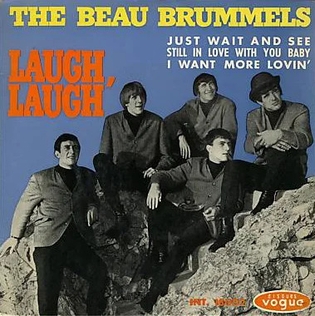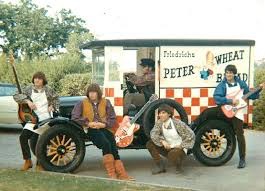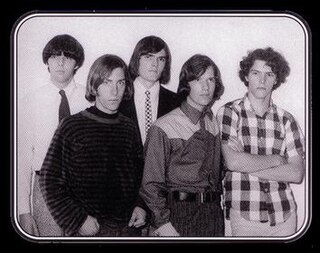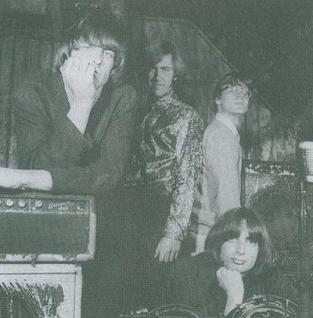
Nuggets: Original Artyfacts from the First Psychedelic Era is a compilation album of American psychedelic and garage rock singles that were released during the mid-to-late 1960s. It was created by Lenny Kaye, who was a writer and clerk at the Village Oldies record shop in New York. He would later become the lead guitarist for the Patti Smith Group. Kaye produced Nuggets under the supervision of Elektra Records founder Jac Holzman. Kaye conceived the project as a series of roughly eight LP installments focusing on different US regions, but Elektra convinced him that one double album would be more commercially viable. It was released on LP by Elektra in 1972 with liner notes by Kaye that contained one of the first uses of the term "punk rock". It was reissued with a new cover design by Sire Records in 1976. In the 1980s, Rhino Records issued Nuggets in a series of fifteen installments, and in 1998 as a 4-cd box set.
Acid rock is a loosely defined type of rock music that evolved out of the mid-1960s garage punk movement and helped launch the psychedelic subculture. Named after lysergic acid diethylamide (LSD), the style is generally defined by heavy, distorted guitars, lyrics with drug references, and long improvised jams. Much of the style overlaps with 1960s garage punk, proto-metal, and early heavy, blues-based hard rock.

The Chocolate Watchband is an American garage rock band that formed in 1965 in Los Altos, California. The band went through several lineup changes during its existence. Combining psychedelic and garage rock components, their sound was marked by David Aguilar's lead vocals, songwriting, as well as proto-punk musical arrangements. The band's rebellious musical posture made them one of the harder-edged groups of the period with many critics labeling them as America's answer to the Rolling Stones.

The San Francisco sound refers to rock music performed live and recorded by San Francisco-based rock groups of the mid-1960s to early 1970s. It was associated with the counterculture community in San Francisco, particularly the Haight-Ashbury district, during these years. San Francisco is a westward-looking port city, a city that at the time was 'big enough' but not manic like New York City or spread out like Los Angeles. Hence, it could support a 'scene'. According to journalist Ed Vulliamy, "A core of Haight Ashbury bands played with each other, for each other"

The Leaves were an American garage rock band formed in San Fernando Valley, California, United States, in 1964. They are best known for their version of the song "Hey Joe", which was a hit in 1966. Theirs is the earliest release of this song, which became a rock standard.

The KFRC Fantasy Fair and Magic Mountain Music Festival was an event held June 10 and 11, 1967, at the 4,000-seat Sidney B. Cushing Memorial Amphitheatre high on the south face of Mount Tamalpais in Marin County, California. Although 20,000 tickets were reported to have been sold for the event, as many as 40,000 people may have actually attended the two-day concert, which was the first of a series of San Francisco–area cultural events known as the Summer of Love. The Fantasy Fair was influenced by the popular Renaissance Pleasure Faire and became a prototype for large scale multi-act outdoor rock music events now known as rock festivals.

Born to Be Burned is a compilation album by the San Francisco garage rock and psychedelic rock band The Great Society. The album is made up of material recorded during the band's short-lived association with Autumn Records in 1965, with the majority of it previously unreleased. The exceptions to this are the songs "Someone to Love" and "Free Advice", which had both been issued as a single on Northbeach Records, a subsidiary of Autumn Records, in February 1966.
Robert "Bobby" Winkelman is an American singer, song writer, rhythm guitarist, and bass guitarist. He was a founding member of the East Bay band, "The Epics".
The Other Half was an American psychedelic garage rock band, based in San Francisco, and active in the mid-to-late 1960s. The band gained interest after one of the Nuggets compilations in the 1980s included their single, "Mr. Pharmacist".

Ace of Cups is an American rock band formed in San Francisco in 1967 during the Summer of Love era. It has been described as one of the first all-female rock bands.

The Amazing Charlatans is a compilation album by the American psychedelic rock band the Charlatans that was released in 1996 by Big Beat Records. The album is a collection of demos, tracks that appeared on singles, and previously unreleased sessions that the band recorded between August 1965 and early 1968, at a variety of different San Francisco studios.

"Laugh, Laugh" is a song by American rock group The Beau Brummels, written by guitarist Ron Elliott and produced by Sylvester Stewart, later known as Sly Stone. Released in December 1964 as the band's debut single, the song reached number 15 on the U.S. Billboard Hot 100 chart the following February. "Laugh, Laugh" was the first hit single to come out of the emerging San Francisco music scene in response to the British Invasion. The song was later included on the band's first full-length album, Introducing the Beau Brummels, released in April 1965.

The Mystery Trend was an American garage rock band formed in San Francisco, California in 1964. The band was among the first wave of San Francisco rock groups to emerge from the city's growing music scene. Exhibiting music prowess leaning toward R&B, the Mystery Trend were set apart from their contemporaries who later developed into psychedelic rock groups. Their recording output was limited, with the group's one single, "Johnny Was a Good Boy", being released in 1967.

"Can't Seem to Make You Mine" is a song by American rock group the Seeds, written by vocalist Sky Saxon and produced by Marcus Tybalt. It was released as a single in 1965 and re-issued in 1967, when it peaked at number 41 on the U.S. Billboard Hot 100 chart, and number 33 in Canada.

Peter Wheat and the Breadmen were an American garage rock band formed in Fremont, California, in 1964. The group became a popular live attraction regionally, and released one single that has since been reissued on compilation albums.

Harbinger Complex was an American garage rock/psychedelic rock band from Fremont, California, who were active in the mid-1960s. In the years since their breakup, their work has come to the attention of garage rock fans and collectors and has appeared on several retrospective compilations including the Nuggets 4-CD box set. They are best-remembered for their 1966 song, "I Think I'm Down."

Teddy and His Patches were an American garage rock band formed in San Jose, California in 1964. The group, for the greater duration of its existence, was rather straightforward in their musical style; however, their best-known recording, "Suzy Creamcheese", exemplifies some of the odder aspects of psychedelia. The song was a regional hit and has since achieved favor among psychedelic music enthusiasts, who rediscovered the composition through several compilation albums.

The Oxford Circle was an American garage rock and psychedelic rock band from Davis, California, near Sacramento, who were active from 1964 to 1967. They became a popular garage rock act with a proto-punk sound influenced by Them and other blues-based bands of the British Invasion, that, in addition to heavy guitar feedback, came to encompass psychedelia. The group began to make appearances in San Francisco, where they became a top draw in venues such as the Avalon Ballroom. They taped a show at the Avalon in 1966 and, after lying in the vaults for years, it was rereleased in 1997 on the Nuggets from California: Live at the Avalon 1966 anthology. In 1967, they released the single, "Foolish Woman" b/w "Mind Destruction", which is also included, along with several other studio outtakes, on the Nuggets from California compilation. In 1967, drummer Paul Whaley left to play in pioneering heavy rock act Blue Cheer. Lead vocalist and guitarist Gary Lee Yoder and bassist Dehner Patten left to form Kak, who recorded for Epic Records. Yoder subsequently went on to join Blue Cheer in one of their later configurations.

The Final Solution was an American garage rock band formed in San Francisco, California, in 1965. An early group in the development of what later became known as the San Francisco Sound, the Final Solution contradicted its contemporaries with their controversial name and grim lyrics composed by lead guitarist Ernie Fosselius and bassist Bob Knickerbocker. Although the group never released any recordings in their career, the band was pivotal in the San Francisco's live music scene. A recording of the Final Solution performing at the Matrix in 1966 exists and is available, particularly "So Long Goodbye", which appears on Pebbles, Volume 22.
Alejandro "Alec" Palao is a British musician, music historian, writer, and reissue producer. In addition to his musical output with groups like the Sting-Rays, the Sneetches, and Mushroom, his works include hundreds of production credits and liner notes on important compilations of vintage rock and soul from Ace Records, Rhino Records, and others, plus a wide array of music-related print and film credits. Palao is unusual in that he normally supervises each aspect of the projects he compiles, including audio transfers and restoration as well as research and liner notes. Honors include five Grammy Award nominations for historical albums and liner notes.
















